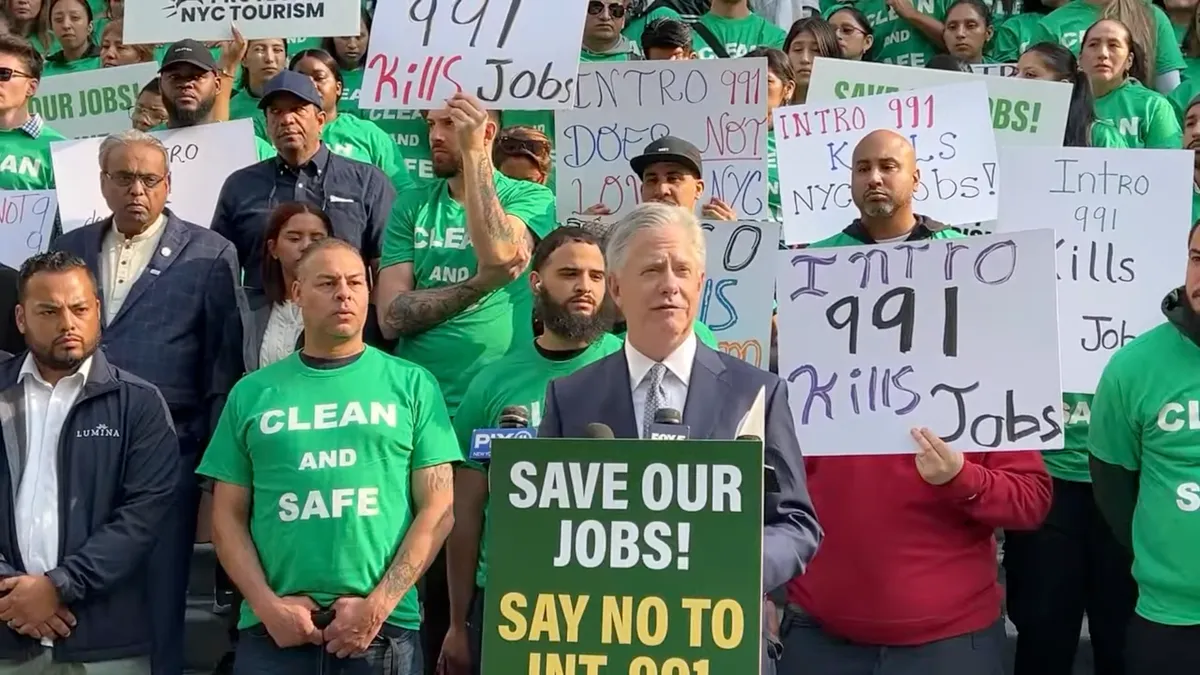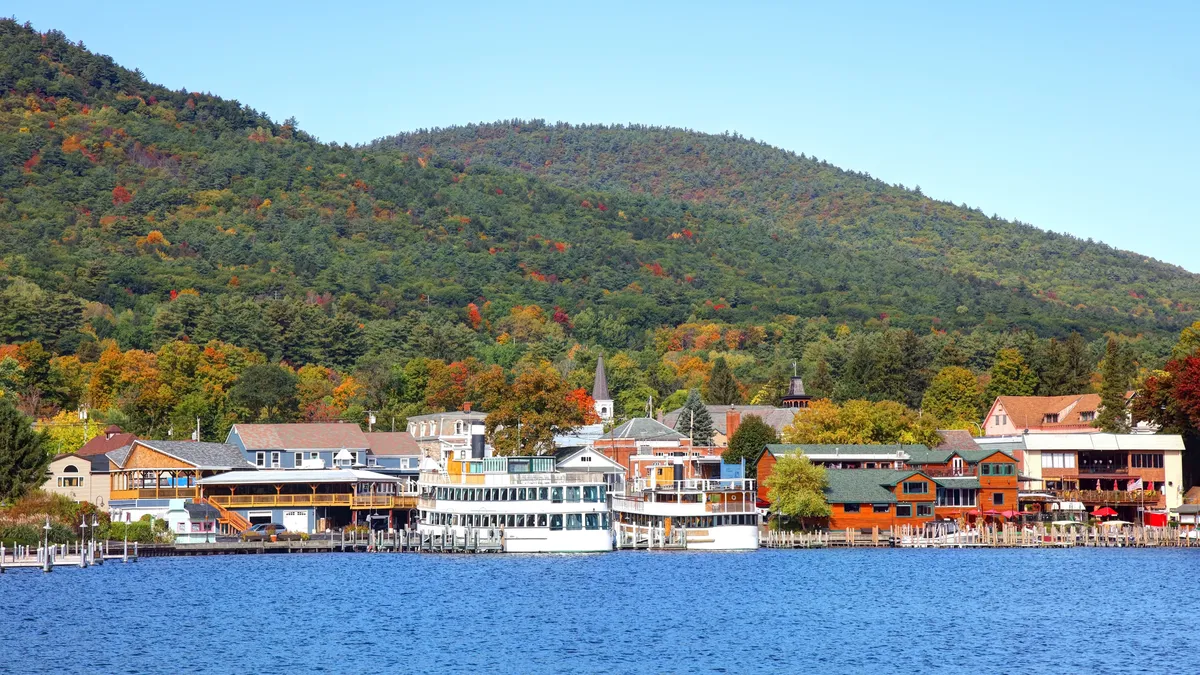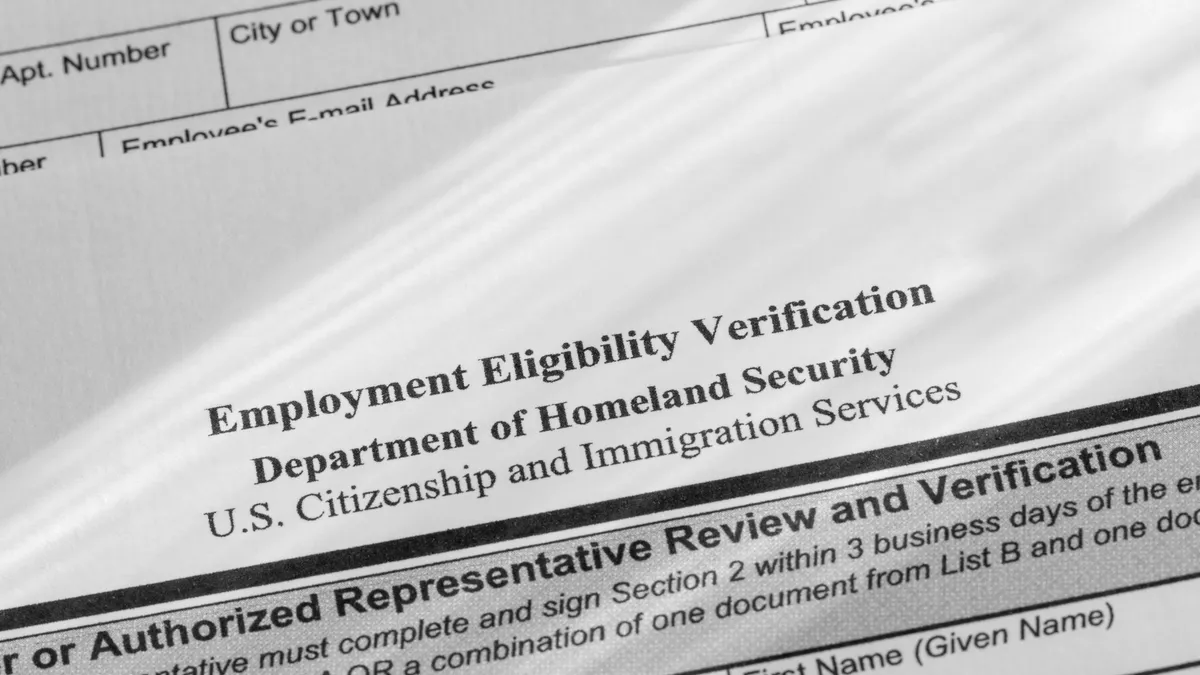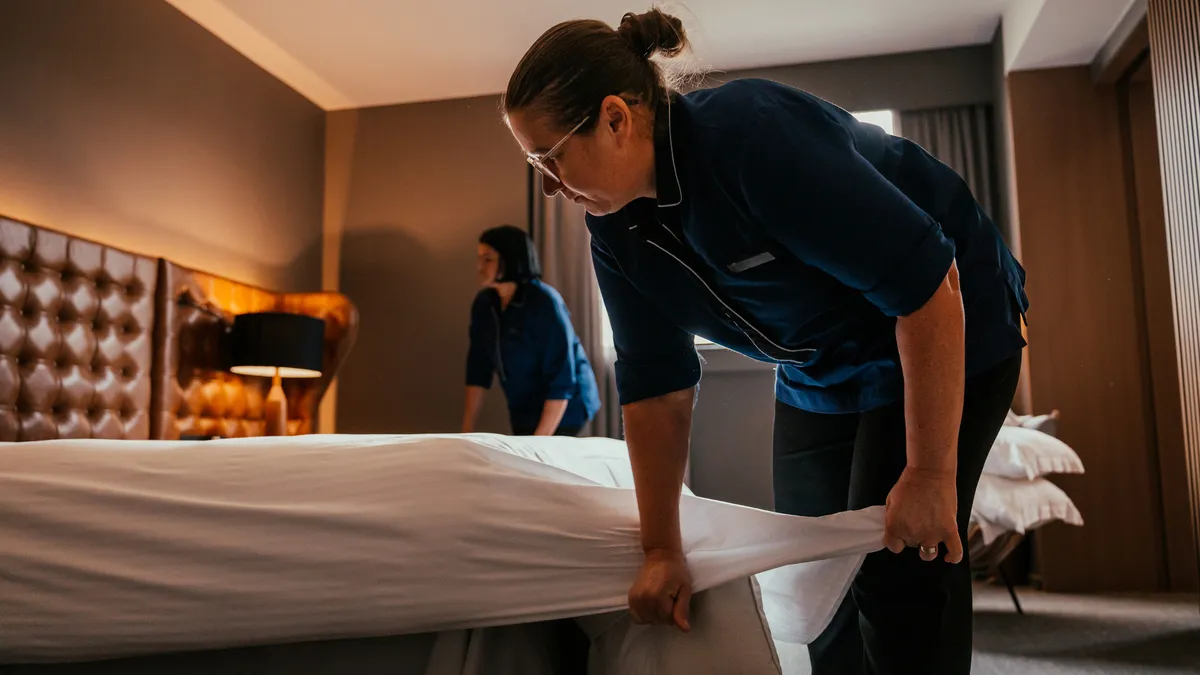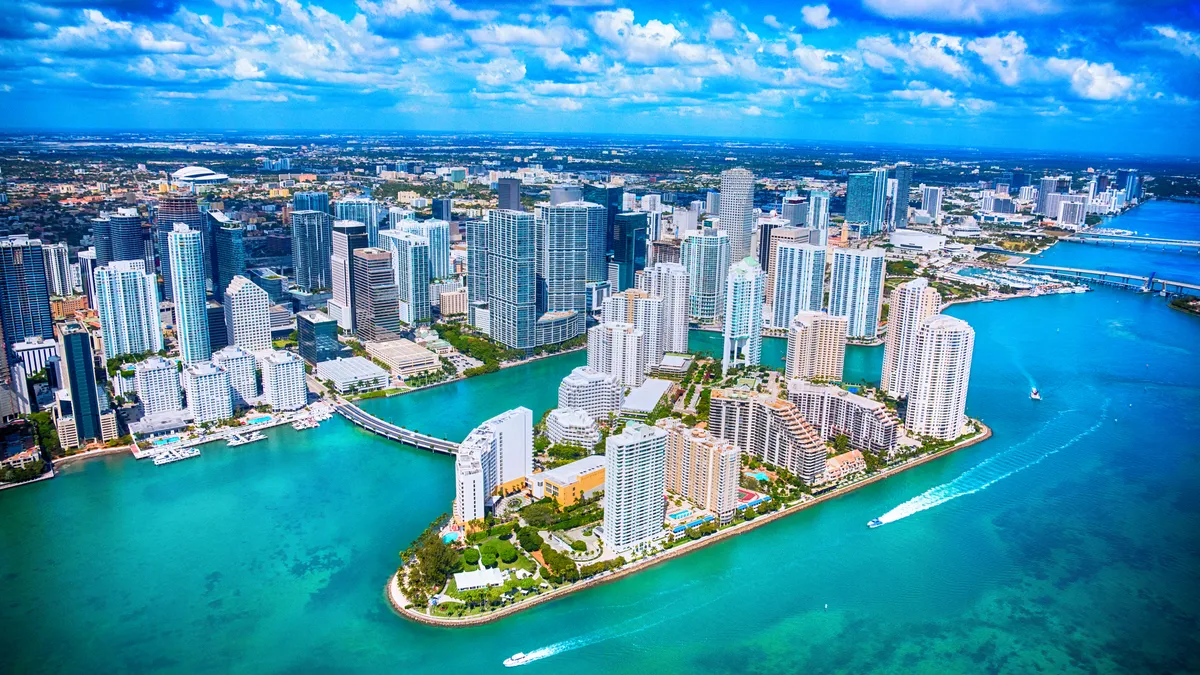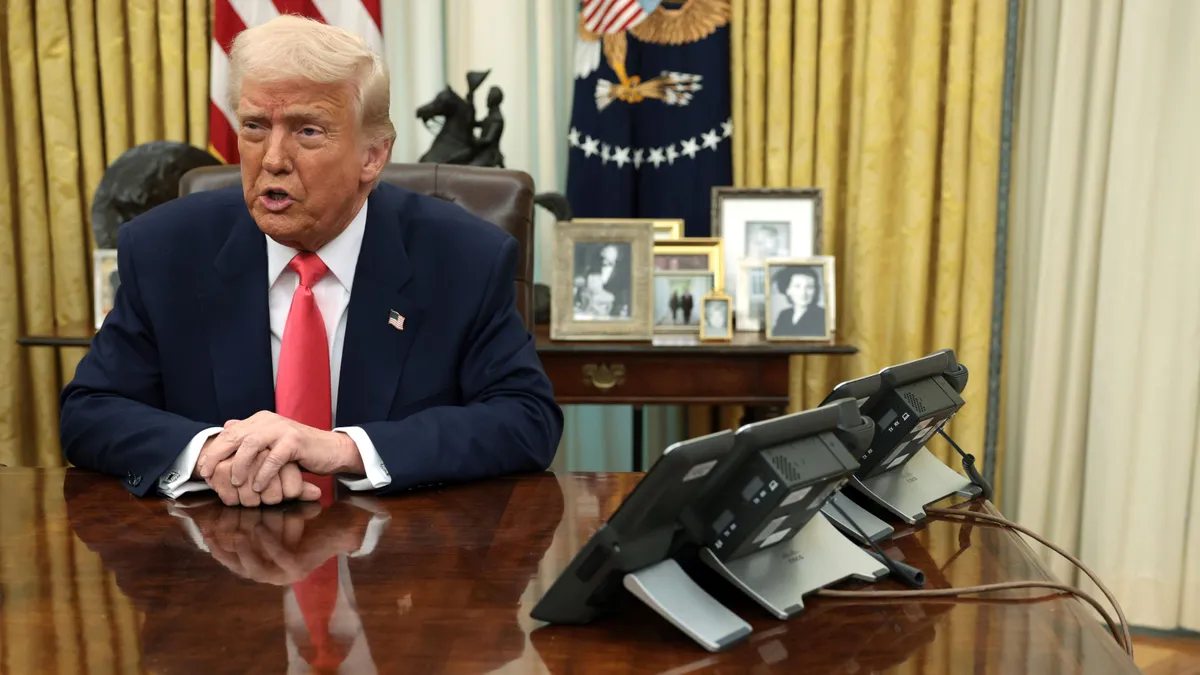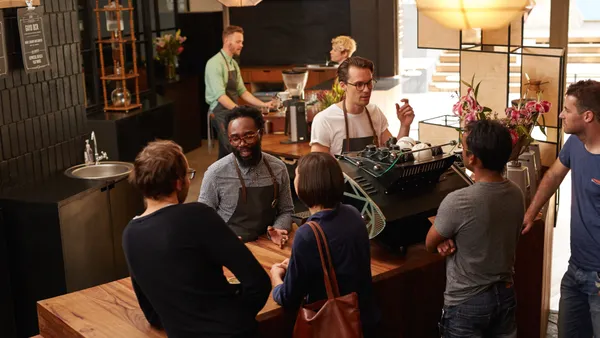Some 1,500 hotel and hospitality professionals took to the steps of New York City Hall Thursday morning to rally in opposition to a proposed bill that would require hotels to obtain a license to operate in the city.
The legislation, dubbed the “Safe Hotels Act,” was proposed in mid-July by City Councilperson Julie Menin. If passed, NYC hotels would also be required to maintain continuous front-desk coverage, with large hotels being required to have continuous coverage by at least one security guard, according to a New York City Council filing.
Additionally, the licensees would have to “directly employ their core employees,” the filing reads. This would prohibit hotels from using subcontractors for functions such as housekeeping, front desk and security, the Asian American Hotel Owners Association noted in a Tuesday release.
Since its proposal, multiple hotel associations have condemned the bill, saying that it would be “destructive” and “devastating” for New York’s hotels and the city’s economy at large. Thursday morning, many of those groups, including AAHOA and the American Hotel & Lodging Association, joined in protest to “kill” the bill.
Industry rallies
The Protect NYC Tourism Coalition, which organized Thursday’s event, announced Tuesday there would be more than 1,000 people in attendance. AHLA Interim President and CEO Kevin Carey said there were closer to 1,500 hospitality professionals present during his address at the rally, which was livestreamed and viewed by Hotel Dive.
Ralliers carried signs reading “Intro 991 kills NYC tourism” and “Save our jobs.” AAHOA and AHLA members were in attendance, as well as members of other Protect NYC Tourism Coalition organizations including the Coalition for Hotel Subcontractors, the Hotel Association of New York City, the NYC Minority Hotel Association and the National Association of Black Hotel Owners, Operators and Developers.
AAHOA Treasurer Rahul Patel and Mid Atlantic Regional Director Mahendra Patel were also there to oppose the bill and “voice concerns about the potentially devastating impact of this act on the hotel industry,” according to an announcement from Chairman Miraj Patel ahead of the event.
The act would threaten tens of thousands of jobs and billions of dollars in economic development, the coalition claims. According to the coalition, the act would add significant costs to hotels, “jeopardizing their ability to operate,” while also straining the city’s tourism industry.
“This bill is bad for everyone. It’s bad for hotels. It’s bad for workers. It’s bad for contractors, many of whom are small, minority or woman-owned businesses. You know it’s bad for the consumers."

Kevin Carey
AHLA Interim President and CEO
Last year, New York City’s tourism industry generated $74 billion in economic impact with more than $48 billion coming from direct spending, according to New York City Tourism + Conventions.
Carey reiterated the coalition’s worries at the rally, as a crowd of protesters chanted in the background. “This bill is bad for everyone,” Carey said. “It’s bad for hotels. It’s bad for workers. It’s bad for contractors, many of whom are small, minority or woman-owned businesses. You know it’s bad for the consumers. And it’s bad for New York City’s economy and, ironically, it’s also bad for New York City’s own fiscal health.”
Carey has condemned the bill from its inception, saying in a July statement that if it becomes law, “thousands of hotel jobs could be lost, hotels will shutter, and New York City’s economy — especially small business retailers, restaurants, and other hotel service providers — will suffer substantially.”
The impact on jobs
There are roughly 42,000 hotel jobs in New York City, and nearly 260,000 jobs that New York City hotels support, according to AHLA.
For one New Yorker and a 10-year hospitality industry veteran, Camilo Torres, the bill’s passing would be the end of his livelihood as he knows it.
Torres owns Lumina HR, a company that provides labor services to hotels in New York City. He told Hotel Dive that if the bill passes, his company — which recruits, hires and manages hospitality workers, helping hotels fill vacant roles — would be virtually useless, as hotels would be tasked with directly staffing their properties. The 250 people he employs would need to be directly hired by a hotel or look for work elsewhere, he said.
There’s going to be a “big influx of employees trying to get into hotels directly, and it's going to cause a bottleneck. A lot of people are going to be out of jobs, and ultimately they're going to be looking into different industries,” Torres said, noting that the act would cause further strain in an already hurting hotel labor market.
“The hospitality industry is going to suffer a lot at the end of the day. The guests are also going to suffer,” Torres said.
Union support
The NY/NJ Hotel & Gaming Workers Union, meanwhile, supports the legislation and said the act would “curb the use of exploitive subcontracting agencies in most hotels.”
In an Aug. 8 statement, following hotel industry pushback on the licensing bill, HTC President Rich Maroko said: “The hotel industry thought that they could bully and intimidate our Union and elected officials into backing off this bill. They obviously don’t know us very well. I don’t care who you are or how deep your pockets are, no one can get in between us and doing what’s best for our members and hotel workers.”
According to the union, the act would safeguard some of the health and safety protections the union has fought for, such as panic buttons, daily room cleaning and greater security measures. Thousands of hotel workers nationwide were on strike over Labor Day weekend protesting for similar workplace protections, as well as increased wages.
In an Aug. 15 post on the social media platform X, Menin also suggested the “Safe Hotels Act” could prevent human trafficking, “essential for public safety.”
What’s next
Thursday's rally, held hours before the City Council’s stated meeting, was aimed at “urging the City Council to kill the bill and preserve jobs,” according to the Protect NYC Tourism Coalition.
AAHOA’s Miraj Patel said in a Tuesday statement he hoped the event would at least “inspire New York City Council to allow for meaningful discussions to shape fair regulations that protect guests, employees, and the community.”
Andy Ingraham, president, CEO and founder of NABHOOD, echoed a similar sentiment, saying in a statement obtained by Hotel Dive: “We urge the City Council to reconsider this bill and work with us to find solutions that support economic growth and job creation – not stifle them.”
Last month, AHLA’s Carey urged Menin and New York City Council leadership to withdraw the legislation after Menin released revisions to the bill on Aug. 2 that were still not up to snuff for the organization.
The bill’s public hearing initially planned for July 30 was postponed in the days preceding, and it’s unclear when it will be rescheduled.
The New York City Council could not be reached for comment.



